M6U1Period3
英语M6U1

M6U1 Laughter is good for you一、单项选择:1. One little-known fact is _____ when Crystal is the host of the Academy Awards, he always keeps a toothbrush in his pocket for good luck!A. /B. thatC. whatD. which2. I _____ tennis every day for a month, so I think I can do well in the coming match.A. have been playingB. playedC. playD. have played3. He says it is because when he started practicing stand-up as a child, he told himself jokes while _____ in front of the mirror, brushing his teeth!A. stoodB. having stoodC. standingD. being stood4. In an interview, he told us that he is always happy to _____ new foreign students.A. take upB. take inC. take onD. take out5. Whoever provides useful evidence for the murder will be _____ 5, 000 yuan.A. awardedB. rewardedC. offeredD. supplied6. When Lin Dan defeated Lee Chongwei of Malaysia to complete a career grand slam(大满贯)at the Asian Games on November 21, 2010, the crowd _____ cheers.A. burst intoB. burst inC. burst outD. burst forth7. It is hoped that you can make some adjustments about the quality of your service _____ the reactions of the customers.A. in return forB. in response toC. in favor ofD. in charge of8. Parks provide people with a place to _____ themselves and to escape their busy lives for a while.A. amazeB. amuseC. interestD. disappoint9. Mistakes don‟t just happen; they occur for a reason. Find out the reason, and then making the mistake becomes _____.A. worthwhileB. essentialC. preciousD. favorable10. Some students find it hard to _____ the new teacher‟s dialect.A.take in B.take up C.take over D.take on11. When he first got to the city, he was often _____ for his strong accent.A. joked aboutB. played a jokeC. made fun ofD. made jokes12. —Is Peter there?— _____, please. I‟ll see if I can find him for you.A. Hold upB. Hold onC. Hold outD. Hold off13. I‟d appreciate _____ if you could take me to watch the Guangzhou Asian Games.A. thatB. itC. thisD. you14. Sandra is a hard worker—I know that she will achieve great success in ___ she decides to do.A. howeverB. whicheverC. whateverD. whenever15. As the driver approached the school, the guard was standing in the middle of the road _____ his stop sign.A. drawing backB. putting onC. handing inD. holding out16. It‟s _____ for China to send up Yinghuo1 this year, though that will be expensive.A. worthB. worthyC. worthwhileD. worthy of17.My morning ________ includes jogging in the park and reading newspapers over breakfast.A. drillB. actionC. regulationD. routine18. These old houses are being _____ to make way for a new road.A. torn downB. torn openC. torn upD. torn into19. Once we had children, Christmas _____ a different sort of importance.A. took upB. took onC. took inD. took away20. Sometimes the fun the stand-up actor makes _____ the audience is not humorous at all.A. aboutB. ofC. withD. on21. There is ________ as a free lunch.A. no such a thingB. no such thingC. such no thingD. not such thing22. ______ her faults, I‟ll stand by her side.A. WhateverB. HoweverC. WhicheverD. Whosever23. He stopped working, as if _________ something.A. doingB. were doingC. were to doD. to do24. Karl knows a lot about Star Wars. He ______ it many times.A. may seeB. would have seenC. must have seenD. must see25. This book is ______ more interesting than the one I read in the library yesterday.A. fairlyB. veryC. quiteD. rather二、单词拼写根据句意或提示填入合适的单词1. There are various/diverse styles of stand-up comedy.There are a _________ of styles of stand-up comedy.2. Some comedians tell jokes about the way people __________ or about daily life.3. A stand-up comedian may __________ an audience member, or might decide to tell different jokes depending on how the audience reacted to his or her __________ jokes.4. He said, …It seems appropriate that he got his start in __________ films!‟The audience __________ with laughter.5. He talked for several minutes, but there was a __________ problem, and no one in the audience could hear him.6. Other comedians rely on ___________ humour. Their humor may be inspired by objects.7. If you take part in sports, your muscles will become strong.If you ____________ in sports, your muscles will be _________.8. ---You should join us on the invisible bench. It‟s nice and _________.---Okay. Thanks for the __________.9. My parents threw the maths paper at me angrily, saying how disappointed they were.My parents threw the maths paper at me in __________, saying how disappointed they were.10. He hopes to do as other famous comedians, such as Bob Hope and George Burns.He hopes to ____________ in the ___________ of other comedians, ____________ Bob Hope and George Burns.三、短语翻译:1、排队___________________2、发表演讲___________________3、从视线中消失___________________4、去世___________________5、哀悼某人的死亡__________________6、列出…的单子___________________7、穿着___________________ 8、在…得第一___________________9、首先___________________10、提高技能___________________11、为…腾出空间___________________12、将…撕成两半___________________13、怒视___________________14、赠送___________________四、句子翻译1、Crystal出名的一个原因是他思维敏捷,经常能就身边的人或事即兴编排笑话。
外研版七年级上册M6U1

2. They come from many different countries and they eat different food. come vi. 来 come from 来自 from后常跟表示国家或地点名称的词 e.g. She comes from London. 她是伦敦人。
1. The zoo has many kinds of animals, such as bears, zebras, giraffes and pandas.
such adj. 这样的;如的 可修饰名词,修饰可数名词单数时要置 于a / an 之前。 e.g. I don’t like such books. 我不喜欢这样的书。
Mary is such a nice girl. 玛丽是一个如此可爱的女孩。 such as意为“比如”。 e.g. John likes sports, such as football, basketball and table tennis. 约翰喜欢运动,比如足球,篮球和 乒乓球。
根据所讲内容将下面的句子翻译成英语。 (1) 今天是如此热的一天。 Today is such a hot day. (2) 汤姆喜欢水果,如香蕉和苹果。
Role play in groups. Tips: • Welcome to... • Does the tiger eat meat? • Do pandas like bamboo? • Is the elephant dangerous? • What’s your favourite animals?
4. Do pandas eat plants and leaves? leaves leaf n. 叶子的复数形式。以-f或fe结尾的名词,变复数时一般要把-f或-fe 变为-ves。此类词有half, knife(小刀)等。 根据所讲内容将下列短语翻译成英语。 many leaves (1) 许多叶子________________ (2) 三把小刀________________ three knives
苏州高新区第一中学高二英语M6U1知识清单-word文档
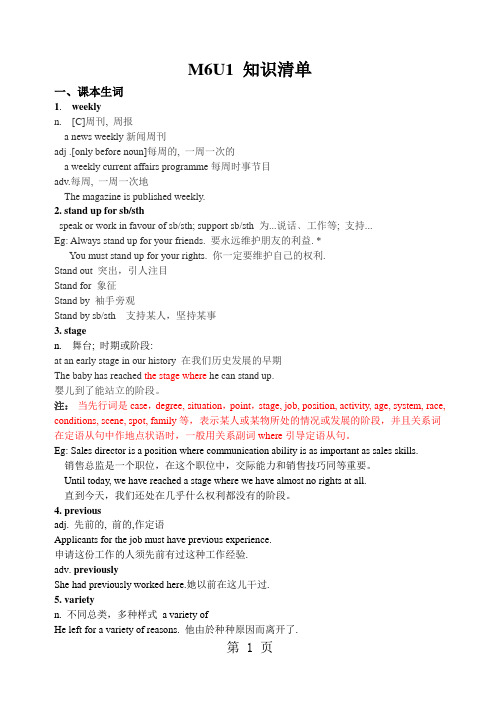
M6U1 知识清单一、课本生词1. weeklyn. [C]周刊, 周报a news weekly新闻周刊adj .[only before noun]每周的, 一周一次的a weekly current affairs programme每周时事节目adv.每周, 一周一次地The magazine is published weekly.2. stand up for sb/sthspeak or work in favour of sb/sth; support sb/sth 为...说话﹑工作等; 支持...Eg: Always stand up for your friends. 要永远维护朋友的利益. *You must stand up for your rights. 你一定要维护自己的权利.Stand out 突出,引人注目Stand for 象征Stand by 袖手旁观Stand by sb/sth 支持某人,坚持某事3. stagen. 舞台; 时期或阶段:at an early stage in our history 在我们历史发展的早期The baby has reached the stage where he can stand up.婴儿到了能站立的阶段。
注:当先行词是case,degree, situation,point,stage, job, position, activity, age, system, race, conditions, scene, spot, family等,表示某人或某物所处的情况或发展的阶段,并且关系词在定语从句中作地点状语时,一般用关系副词where引导定语从句。
Eg: Sales director is a position where communication ability is as important as sales skills.销售总监是一个职位,在这个职位中,交际能力和销售技巧同等重要。
九年级上册英语M6U1知识点

九年级上册英语M6U1知识点九年级上册英语M6U1是关于短文阅读的单元,重点训练学生的阅读理解能力。
本单元的短文主题涵盖了科技发展、人与自然等方面,并通过不同类型的阅读材料,帮助学生提高阅读效率和阅读技巧。
一、科技与社会的关系科技的发展对社会产生了深远的影响。
在本单元的短文中,我们可以了解到一些科技带来的积极变化。
比如,在短文《爱因斯坦与黑洞》中,我们了解到黑洞是一种神秘而又令人惊奇的宇宙现象,科技的进步使得人们能够更加深入地研究和了解黑洞。
这一点揭示了科技在推动人类认知和科学发展方面的重要作用。
二、保护环境与可持续发展环境问题是当今世界所面临的一个重要课题,也是本单元短文的一大关注点。
在短文《重庆独龙古村》中,我们了解到保护自然和文化遗产的重要性。
这篇文章让我们了解到重庆独龙族古村是一个受到国家级保护的村落,为了保护这个村落,人们采取了一系列措施,如限制进入游客的人数、禁止乱扔垃圾、保护村内的文化建筑等。
通过这些措施的实施,可以让我们意识到环境保护对于可持续发展的重要性。
三、人与自然的和谐共生本单元中的短文还涉及了人与自然之间的关系。
在短文《养蜂人》中,我们可以了解到养蜂的重要性以及对人类的贡献。
蜜蜂是自然界中的宝贵资源,它们为我们提供了美味的蜂蜜,并在传粉过程中帮助植物繁殖。
然而,随着现代农业的发展,蜜蜂种群数量逐渐减少,这给我们带来了一定的警示。
这篇短文使我们意识到,保护蜜蜂是保护人与自然之间和谐共生关系的重要一环。
四、提高阅读理解能力九年级上册英语M6U1的短文阅读材料在语言和内容上都有一定的难度。
通过阅读这些短文,我们可以提高自己的阅读理解能力,并学会分析、归纳和总结文章的主旨和细节。
同时,在阅读过程中,我们也能够学到一些新的词汇和表达方式,丰富自己的词汇量和语言运用能力。
大家在学习本单元的知识点时,可以通过多次阅读短文、积累词汇和参与课堂讨论来提高自己的阅读理解能力。
此外,多做阅读理解题和练习,也是巩固知识的有效方法。
M6U1 课件
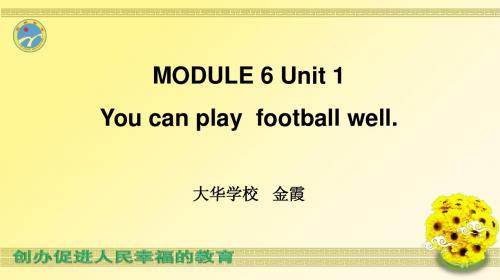
Love sports, love来自life. (爱运动 爱生活)
Thank you!
Make a survey(做调查)Can you ---? Xiaoming can control the ball well .
run fast Xiaoming control the ball (well) jump high catch the ball (well)
…
Lulu
…
He can play football well. He can control the ball well
Listen and answer:
1、Can Lingling run fast ? No, she can’t. 2、Can Lingling control the ball ? No , she can’t . 3、Can Lingling catch the ball ? Yes , she can . 4、Can Lingling jump high ? Yes, she can . 5、Can Lingling be a good goalkeeper ? Yes ,she can .
疑难问题:
1.Do you want to be in our football team? (想成为) want to +动词原形 想要做某事
疑难问题:
2、You were very good at basketball in China.
在中国时你非常擅长篮球。
be good at --- 擅长--如:I am good at English .
MODULE 6 Unit 1 You can play football well.
外研版英语八年级上册M6U1优质课课件

Enjoy the video and answer the question.
What are the speakers talking about?
They are talking about the animals in danger and how to protect them.
Read and imitate.
lion
bear
giraffe
panda zebra
snake
Hale Waihona Puke elephant Wild animals
6
Animals in danger Unit 1 It allows people to get closer to them.
Listen and answer the questions.
people to get closer to the animals. T
3. Many wild animals have a safe placFe to live.
4. We can raise money to help protect the animals. T
Now complete the table.
Please pay attention to the pronunciation and the intonation.
Read silently and then check the sentences true or false.
1. Betty saw the tiger at last. F 2. The Wolong Panda Reserve allows
No trading, no killing.
M6U1公开课教案教学设计课件案例试卷

but it should be cooked at home. What are and ham.
Betty: We can heat it up in the school
kitchen, but it should be cooked
at home. What are you going to make?
海宁名师云课堂
Let's listen.
Q3. What are they going to make?
on the 30th of May. We’re all invited.
or spoon.
D: In fact, I was chosen to play the dance L: Oh, soup’s no good then. What about you?
music.
B: Cheeseburgers. Cheeseburgers are made with
food and drink
French fries Coke cheeseburger
s
music and dancing rock music dance music
Let's listen and circle.
海宁名师云课堂
Let's listen.
Q1. What were the kids invited to do?
“在…制造” 强调 物品的产地
3. The skirt ____is__m__a_d_e__o_f_____ silk. 4. This dish __is__m__a_d_e__w__it_h_ tomatoes and eggs. 5. Some of the trees will _b__e_m__a__d_e_i_n_t_o_ paper.
M6U1Period1

M6 Unit 1 Laughter is good for you(导学案)Period 1 Welcome to the UnitPeriod1(语言感知课)Learning aims(学习目标):1. Make students participate in a discussion about which event they think is the funniest and most enjoyable.2. Encourage students to talk about their favourite comedians and the reasons why people like funny things.3. By talking about the posters and discussing, students’ spoken English can be practised. Important points(学习重点):1. Students are expected to express their own opinions by talking about the posters and discussing.Difficult points(学习难点):To develop the students’ listening and speaking skills.Learning guide(方法导引): Read, copy and recite.Preview navigation(预习导航):Try to collect as many words as possible related to the laughter.Language connection(知识链接):Get to know the topic of this unit. Please answer the questions below:⑴. Are you familiar with these pictures?(2). Did you laugh when you first saw them?(3). Do you think laughter is good for us?(4). Usually what kind of things can make you laugh? Learning procedures (学习过程):Step1: Group work. Look at the following four pictures. Let ’s study them one by one and try to discuss some questions in groups.Pict ure 11. What kind of expression is the man wearing?2. Where is he standing?3. What is he doing there? 4: What might he be saying?5: Where and when can you see the funniest man?Picture 21.What does the poster tell us? 2: What ’s the book about?3: What do critics say about the book?4.Can these remarks attract you?Picture31: What ’s this poster about? 2: Can you tell something about the Chinese crosstalk?3: If you want to learn the crosstalk, what kind of qualities do you need to have? 4: How can you find out more information according to the poster?1: What is this poster about?2:What can we see in a circus?3: Do you think the life in a circus isinteresting?Step2: Extension. After we talked about the four posters, which of the above do you think will be the funniest?1. Who is your favorite comedian? Why do you like him or her?2. Why do people like funny things?3. Divide the students into different groups to discuss. Encourage them to use English while talking. Then collect their answers.Step3: Consolidation. Finish the exercises below.当堂检测:1. 单项填空(1). Doing exercise regularly ________ our health.A.is good inB. is good toC. is good forD. is good at(2).Hearing the humorous story, the class burst into ________.A. laughterB. laughingC. laughD. laughable(3).Jay chou ________a popular singer ________ the young people.A. is famous for; toB. is famous for; asC. is well-known to; forD. is well-known as; to(4).You’d better call her ________ the questions referred to in her last letter.A. in answer toB. in response toC. in return forD. in honor of(5).The match we are watching is ________ broadcast.A. livelyB. livingC. liveD. alive2. 完成下列句子(每空一词)(1). I am not ________ ________ ________(嘲笑) you. I admire what you did.(2). ________ ________(后来), the poor man got a job as a cleaner.(3). If you don’t ________________ (同意) us, just say it out.(4). We didn’t ________________ (意见一致) how to do it.(5).They all ________________ (同意) that plan for the holiday.。
m6u1task—project语言点教师版_
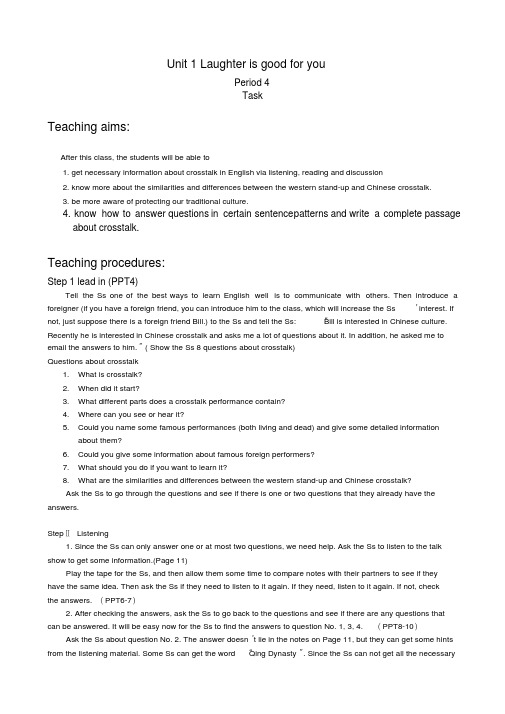
Unit 1 Laughter is good for youPeriod 4TaskTeaching aims:After this class, the students will be able to1. get necessary information about crosstalk in English via listening, reading and discussion2. know more about the similarities and differences between the western stand-up and Chinese crosstalk.3. be more aware of protecting our traditional culture.4. know how to answer questions in certain sentence p atterns and write a complete passageabout crosstalk.Teaching procedures:Step 1 lead in (PPT4)Tell the Ss one of the best ways to learn English well is to communicate with others. Then introduce a foreigner (if you have a foreign friend, you can introduce him to the class, which will increase the Ss’ interest. If not, just suppose there is a foreign friend Bill.) to the Ss and tell the Ss: “Bill is interested in Chinese culture. Recently he is interested in Chinese crosstalk and asks me a lot of questions about it. In addition, he asked me to email the answers to him.” ( Show the Ss 8 questions about crosstalk)Questions about crosstalk1.What is crosstalk?2.When did it start?3.What different parts does a crosstalk performance contain?4.Where can you see or hear it?5.Could you name some famous performances (both living and dead) and give some detailed informationabout them?6.Could you give some information about famous foreign performers?7.What should you do if you want to learn it?8.What are the similarities and differences between the western stand-up and Chinese crosstalk?Ask the Ss to go through the questions and see if there is one or two questions that they already have the answers.StepⅡListening1. Since the Ss can only answer one or at most two questions, we need help. Ask the Ss to listen to the talk show to get some information.(Page 11)Play the tape for the Ss, and then allow them some time to compare notes with their partners to see if theyhave the same idea. Then ask the Ss if they need to listen to it again. If they need, listen to it again. If not, checkthe answers. (PPT6-7)2. After checking the answers, ask the Ss to go back to the questions and see if there are any questions thatcan be answered. It will be easy now for the Ss to find the answers to question No. 1, 3, 4. (PPT8-10)Ask the Ss about question No. 2. The answer doesn’t lie in the notes on Page 11, but they can get some hints from the listening material. Some Ss can get the word “Qing Dynasty”. Since the Ss can not get all the necessaryinformation, give the Ss some key words and ask them to make up sentences about the history of crosstalk. Thekey words are: “Qing Dynasty, 150 years, the first crosstalk performer, Zhu Shaowen, Beijing”, then we can get “Crosstalk began in Beijing during the Qing Dynasty, over 150 years ago. The first crosstalk performer is calledZhu Shaowen and he started such a comedy form in Beijing.”(PPT11)3. Ask the Ss if there is any other question that can be answered. That will be question No. 7. It is not difficult for the Ss—They must understand the Chinese language and Chinese culture to enjoy crosstalk.Step III ReadingThe teacher may say to the Ss: “So if you want to learn crosstalk, you have to learn the language, but if you want to become a crosstalk comedian, is it enough to learn the Chinese language? What else do you need to do if you want to become a crosstalk performer?”1. Ask the Ss to read the passage on Page 11. Ask the Ss to find the three stages to become a crosstalk performer. (PPT15)(1) Have an interest in it;(2) Listen to and copy the traditional pieces of crosstalk;(3) Create crosstalk dialogues in pairs.From the three stages, we can conclude that besides language we also need “interest”, “practice/hard work”and “creativity”.(Ask the Ss to summarize it )2. Ask the Ss to go back to the questions and see if there is any more questions that can be answered.(PPT13-14)The Ss will find that question No. 5 and 6 can be answered. After each question, allow the Ss a chance to enjoy a short video about foreign performers and Ma Sanli. After the Ss enjoyed the crosstalk by Ma Sanli. Give them some information about Ma Sanli: “Ma Sanli was born in 1914 and started to perform crosstalk in 1930, atthe age of 16. Actually he was from a famous crosstalk family. He talked about small things happening in ourdaily life, so he was very popular among common people.” (The teacher can choose another performer according to his/her own interest.)Ask the Ss about their favorite crosstalk performer. Usually the Ss can only name their favorite comedian, so ask the Ss to collect information about their favorite performers and add the information to the email.3. After question 6, the teacher can show the Ss a video of the foreign performers to add to the interest.(It depends.)Step IV DiscussionTell the Ss: “Now we have only question No. 8 left, and we cannot get any information from the listeningand reading. Fortunately, we talked about “stand-up”in the reading part of this unit, and we have talked a lot about crosstalk today, so now it is your turn to come up with something about this question.”1. Allow the Ss around 5 minutes to discuss in groups of four and then collect their opinions. (During thispart, the teacher should give some help according to the Ss’ reaction.)Similarities: (1) The comedians are right in front of the audience, and communicate with the audience andamuse the audience;(2) The comedians will use different skills to makes jokes;(3) The comedians try to reveal something about lifeDifferences: (1)Stand-up-- Only involves one comedian; Crosstalk—Involves one, two, three or more people;(2) Stand-up---Involves more improvising; Crosstalk—is more fixed.(The similarity like “they are both comedies and about telling jokes” and the difference like “the languagesare different, one is in English, the other is in Chinese” are obvious, and can be dealt with orally.)Step ⅤComposition1.Ask the Ss: “How can we put all the sentences into a whole passage? Can we just put the answers togetherone by one?”2.Guide the Ss to use certain sentence patterns to organize their language.You wanted to know …Since you asked about …I know you need/want/would like information about …You asked me about …Regarding your question about …In answer to/ In reply to/ In response to your question about …Make a conclusion that when you answer a question, you have to mention it. Then the reader will be clearwhich question you are talking about.3.Give the Ss example sentences to make sure they know how to do it.(1) In reference to your question about famous performers, I’d like to say something about Ding GuangHe is …(2) You wanted to know what different parts a crosstalk performance contains, and I would say it involvestalking, imitating, singing and telling jokes.4. PracticeAsk the Ss to choose one or two questions to answer, using the sentence patterns.Step ⅥWritingWrite an e-mail to the foreigner, and you should include in your e-mail:1.The answers to questions 1,2,3 and 5;2.Add the information you get after class about your favorite crosstalk performer;3.Choose another 2 questions to answer.If possible, choose the emails of one or two students’ who finished early to read to the class. Ask other Ss to givecomments.Step ⅦLanguage study1.Then they move on to creating crosstalk dialogues with him.然后他们接下去和他一起创作相声对话。
BOOK 12 M6 U1

They will make a paper Chinese spaceship.
6.Who is very interested in the book ?
Daming is very interested in the book.
Try to retell the text. 试着复述本课对话。 E.g. On Daming’s birthday ,Simon’s mum bought a book for Daming. It’s about… .
Show time:
Practise writing : My Last Birthday
Look and say :
buy I often ______ a book for you .
I bought you a book. I bought a book for you yesterday. . last week. thought last Sunday. brought last weekend. /ɔ:/ last month. two days ago . the day before yesterday. on Saturday.
They are interested in flying kites.
Look and say a sentence with “interested” and “ interesting”.
The little girl is interested in the interesting dog.
Book 12 Module 6 Unit 1
I bought a book for you .
【2021年】【课件】M6U1课标分析
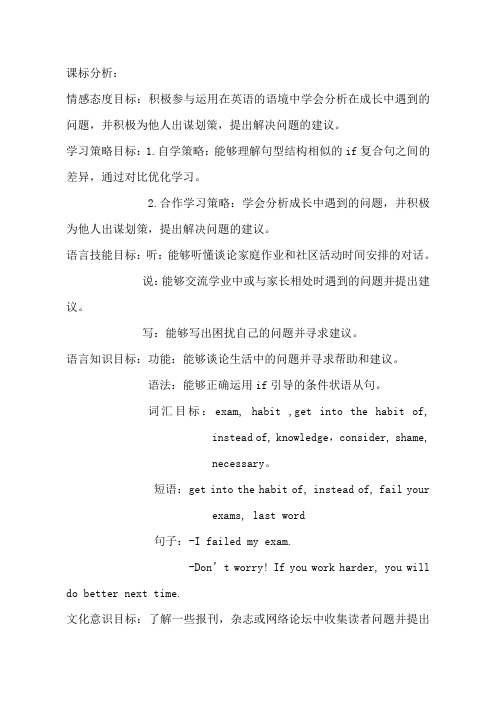
课标分析:
情感态度目标:积极参与运用在英语的语境中学会分析在成长中遇到的问题,并积极为他人出谋划策,提出解决问题的建议。
学习策略目标:1.自学策略:能够理解句型结构相似的if复合句之间的差异,通过对比优化学习。
2.合作学习策略:学会分析成长中遇到的问题,并积极为他人出谋划策,提出解决问题的建议。
语言技能目标:听:能够听懂谈论家庭作业和社区活动时间安排的对话。
说:能够交流学业中或与家长相处时遇到的问题并提出建议。
写:能够写出困扰自己的问题并寻求建议。
语言知识目标:功能:能够谈论生活中的问题并寻求帮助和建议。
语法:能够正确运用if引导的条件状语从句。
词汇目标:exam, habit ,get into the habit of,
instead of, knowledge,consider, shame,
necessary。
短语:get into the habit of, instead of, fail your
exams, last word
句子:-I failed my exam.
-Don’t worry! If you work harder, you will do better next time.
文化意识目标:了解一些报刊,杂志或网络论坛中收集读者问题并提出
建议的栏目,会通过不同途径向他人寻求建议。
外研版三起五上M6u1
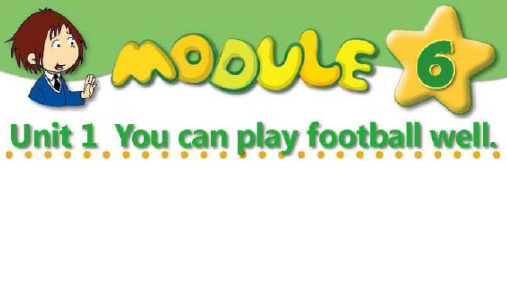
Read the whole dialogue and answer: Why do they talk football with Lingling?
Because they want Lingling tob_e_i_n_t_h_e_f_o_o_tb_a_l_l_te_a_m___.
What role(角色) can Lingling be in the football team? She can be a __g_o_o_d__/ _fa_n_t_a_st_ic__g_o_a_lk_e_e_p_e_r.
Tips: short , tall , strong, thin , fat,
Can he play basketball well?
What kind of people can play basketball well?
They can jump high. They can pass the ball well. They are strong. They throw the ball (投球)well. They pracrice (练习)a lot.
Can she play basketball well?
Yes , she can. She is good at playing basketball.
What can Lingling do well? She can jump really high. She can catch the ball well.
Can the short boy play basketball well?
Can you....? Yes, I can . No , I can’t. Can you....well? Yes, I can . No , I can’t.
- 1、下载文档前请自行甄别文档内容的完整性,平台不提供额外的编辑、内容补充、找答案等附加服务。
- 2、"仅部分预览"的文档,不可在线预览部分如存在完整性等问题,可反馈申请退款(可完整预览的文档不适用该条件!)。
- 3、如文档侵犯您的权益,请联系客服反馈,我们会尽快为您处理(人工客服工作时间:9:00-18:30)。
M6 Unit 1 Laughter is good for youReading Stand-up for your healthPeriod 3(知识点学习课)Learning aims:1. Raise reading ability by focusing on language points.2. Grasp the new language usage in the text by learning the text.Important points :To manage the usage of the words and expressions of the passage.Difficult points:To learn how to put these useful words and expressions into use.Learning guide: Read, copy and recite.Preview navigation:Please review the text to find out some difficult words and expressions that you don’t understand.Language connection: Please look up the phrases in the dictionary.__________单口喜剧___________幽默__________喜剧__________喜剧演员__________反应__________主要的__________道具__________形体动作的__________观察评论的__________印象模仿的__________幽默的;滑稽的__________视觉的__________网球__________舞台__________男演员__________取笑__________拿……来开玩笑Step1: Read the text and try to find the following phrases &sentences and underline them from the book. Make a list of what you know about the language points.1. A stand-up comedian may tease an audience member, or he or she might decide to tell different jokes depending upon how the audience reacted to his or her previous jokes. (Lines 5-6)2. For example, they may talk about how people act when they queue up, or they may ask why it only rains when you forget your umbrella.(Lines9-10)3. For example, one comedian used huge hammer to break watermelons while he makes jokes about what he is doing. (Lines 12-13)5. Another comedian points to a computer tennis game and says …(Line 14)6. Yet other comedians may trip over chairs, walk into doors, and fall down on stage in order tomake people laugh. (Lines 16-17)7. Only a few stand-up comedians have become famous as television and film performer later on in life. One such a person is Billy Crystal (Lines 24-25)Step2. Try to memorize all the words and phrases and put them into use:(想一想,记一记)1. A stand-up comedian may tease an audience member, or he or she might decide to tell different jokes depending upon how the audience reacted to his or her previous jokes. (lines 5-6) tease: make fun ofcause people to laugh at sb./sth., usually unkindly; ridicule sb./sth. 取笑;拿……开玩笑【短语拓展】tease=make fun of=laugh at开玩笑;嘲笑play jokes on 开……的玩笑play a trick on捉弄;开玩笑have fun=enjoy oneselffor fun/in fun开玩笑地(1). It’s cruel to make fun of /tease people who stammer.___________________.(2). Don’t play jokes on that poor girl.______________________________.(3). Don’t be serious. He just played a trick on you just now.______________________________________________________________.(4). 她意识到自己正在被别人取笑。
_____________________________________________________________.(5). 夏天在海里游泳多么有趣啊!_____________________________________________________________.may/might,情态动词用于肯定句中,表示不太肯定的推测, 意为“有可能” must表推测,意为“一定,准是”,can用于疑问句, 意为“有……的可能吗”,用于否定句, 表示“不可能”。
It may be true, but I’m not sure.___________________________________.He may not have heard his name called.___________________________.He can’t have finished the work so soon.___________________________.Where can he have gone?_________________________________________.They can’t have a lot of money.___________________________________.It must have rained last night, for the ground is wet.______________________________________________________________.(1). He ________ have completed his work, otherwise, he wouldn’t be enjoying himself by the seaside.A shouldB mustC wouldn’tD can’t(2). --- Is jack on duty today?---It ________ be him. It’s his turn tomorrow.A mustn’tB won’tC can’tD needn’treact v. reaction n.v. response to a situation, an act, an influence, etc. 对情况、行动、影响等作出反应,回应。
What’s his ________ ________ the news?What did he ________ ________ the news?2. For example, they may talk about how people act when they queue up, or they may ask why it only rains when you forget your umbrella.(lines9-10)queue up 排队(等候)= wait in linequeue up for 为……而排队等候(1). 他们排队等候看电影。
__________________________________________(2). 孩子们排队一小时等候买票。
____________________________________5. Another comedian points to a computer tennis game and says …(line 14)【短语拓展】point to 指向point at 指着point out 指出a point of view 观点to the point 中肯;扼要off the point离题;偏题on the point of … 正在……之时there is no point in doing sth _____________(1). It’s rude to _______ your fingers ________ people.(2). He ________ that they were mistaken.(3). The hands of the clock now ________ half past three.(4). I was ___________________ (正要离开房间,这时) the telephone rang.(5). There’s no point in getting angry. ______________________________.7. Only a few stand-up comedians have become famous as television and film performer later on in life. One such a person is Billy Crystal… (lines 24-25)such adj. 如此,这样的,用来修饰形容词,当such与one, no, any, all, many, some , few, several连用时,such 放在这些词的后面。
